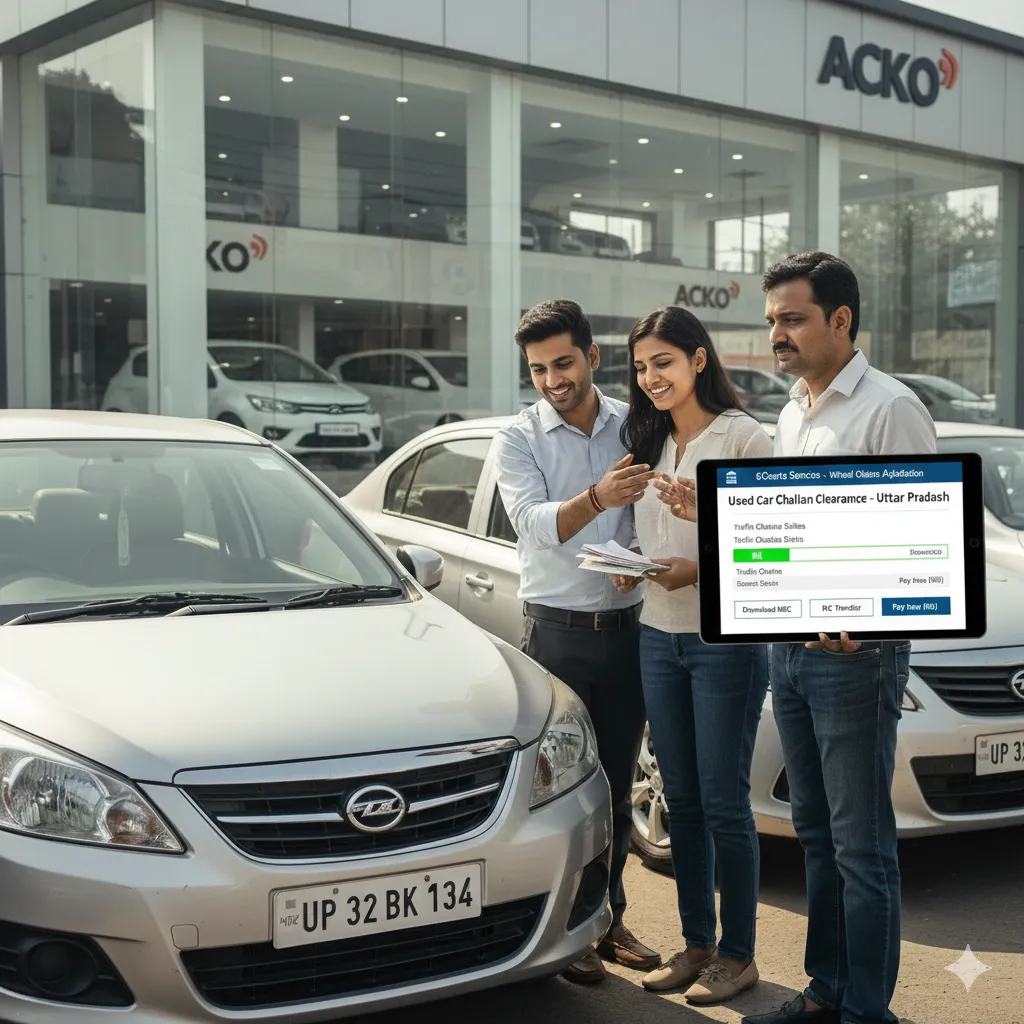speak for ACKO
speak for ACKO
speak for ACKO
Home / Motor Insurance / Articles / Traffic Rules / Buying or Selling a Used Car and Challan Clearance
Buying or Selling a Used Car and Challan Clearance
Saumya SrivastavaNov 28, 2025
Share Post
When buying or selling a used car, many people focus on pricing, condition, and paperwork. However, one crucial step is often overlooked, which is the clearance of the used car challan. Unpaid traffic fines associated with the vehicle can cause complications during ownership transfer and even lead to legal issues. Hence, it is advisable to conduct an online challan check quickly with ACKO to avoid penalties.
Therefore, clearing all challans protects both buyers and sellers, ensuring a smooth and hassle-free transaction. Continue reading this article to learn more about buying and selling a used car, as well as challan clearance.

Contents
Forms Used by RTOs to Buy or Sell a Used Car
Other than the used car challan clearance, the following RTO forms must be filled out when selling a used car to facilitate the transfer of its ownership:
Form 28: No Objection Certificate (NOC)
Form 28 will be required in the event of selling or transferring a vehicle to a different state. It states that there are no outstanding loans, challans, or legal disputes. The required documents are the RC, insurance, PUC, and valid ID and address proof.
Form 29: Transfer of Ownership
Form 29 informs the RTO that the seller is selling the vehicle to a new owner. It contains the information about registration number, seller and buyer details, and car specifications.
Form 30: Final Intimation of Ownership
The declaration in Form 30 is that of the transfer being initiated pursuant to Form 29. It should be sent within 14 days and it might need the approval of financiers in case of a loan.
Form 35: Removal of Hypothecation
Form 35 eliminates the name of the financier in the event that the loan is repaid. It requires the RC, the loan closure letter and insurance details.
The Importance of Used Car Challan Clearance
Over 70% challans remain unpaid in India, amounting to ₹34,000. Therefore, before entering into a used car transaction, understanding the importance of challan clearance is essential for the following reasons:
1. Ensures a Legally Compliant Transfer
Traffic challans are attached to the vehicle and not the driver. The new owner might struggle with the process of RC transfer if the former owner owed fines that had not been paid over the years. Services like UP online vehicle challan check can be used to clear challans even before they become due. In this manner, the authorities do not object to the transfer of the sale.
2. Prevents Unexpected Liabilities for Buyers
Any buyer who buys a car without realising that it has outstanding fines may end up paying the fines later. This may be an unwarranted financial strain and influence on their experience with the car. The buyers safeguard themselves against the unexpected by checking the challans before the deal has been finalised.
3. Strengthens Trust Between Both Parties
The sellers with evidence of used car challan clearance may seem credible and transparent. This gives buyers more confidence and will be able to negotiate a better price. To the sellers, the advance clearance of challans also makes the process faster, as buyers become more confident in the ownership of the vehicle.
4. Avoids Delays in Insurance and Documentation
The requirement for clean records is necessary to carry out the insurance renewal process, PUC update, and loan processing. Holding up of challans can lead to delays/rejection. Paying fines will ensure that all paperwork is easily processed without any waiting once a sale has been made.
Final Thoughts
Clearance of used car challan is an important aspect that is often neglected when a used car is being bought or sold. Clearance of fines and checking of traffic fines ensures compliance with the law, avoids conflicts, and safeguards both parties against liability. Therefore, taking these steps will ensure a straightforward ownership transfer and a reliable transaction experience if you perform them early.
To secure your peace of mind, choose ACKO’s fast, hassle-free car insurance to stay protected throughout every step of your vehicle ownership journey!
Frequently Asked Questions
How can I check if a used car has challans without the seller’s help?
You can check pending challans before buying cars independently using the vehicle’s registration number on government platforms such as the Parivahan e-challan portal or relevant state transport websites. No login or owner details are required.
Can challans from another state affect the sale of a used car?
Yes. Challans issued in any state remain linked to the vehicle nationwide. You must clear these before ownership transfer, especially during interstate RC transfer.
Can I get a refund for challan payments if the sale is cancelled later?
No. Challan payments are final as they settle existing traffic violations. However, clearing them strengthens the vehicle’s credibility for future sales.
Can a buyer request written proof of challan clearance?
Absolutely. Buyers can ask for payment receipts or a screenshot of the challan status page showing “No Pending Challans” before finalising the deal.
Do pending challans affect car loans or refinancing applications?
Yes. Banks may delay or reject loan, refinancing, or hypothecation removal requests if the vehicle has unresolved challans, as it indicates incomplete legal compliance.

Was this article helpful?

Recent
Articles
Is Dealer-Provided Insurance Always the Best Option?
Nikhila PS Jan 7, 2026
How to Transfer a Car Insurance to a New Owner in India
Nikhila PS Dec 31, 2025
10 Tips to Reduce Your Car Insurance Premium
Team Acko Dec 30, 2025
How to Choose the Right Travel Insurance Policy?
Team Acko Dec 30, 2025
How much travel insurance coverage do I need?
Team Acko Dec 30, 2025
All Articles
Want to post any comments?
Check Traffic Challans Instantly ⚡️
Enter your vehicle number
Check your challans
